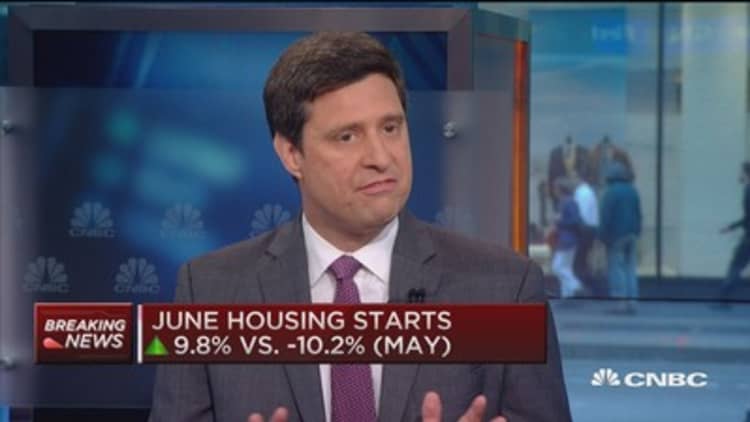
Every time it looks like the economic field of vision is clearing, something seems to happen to blur it up again.
As the Federal Reserve looks for a clear-cut sign to rise rates, Friday's inflation report brought a little something to both sides of the debate: Signs of upward pressure in the headline numbers, but no persistent wage pressures in the underlying mix.
The 0.3 percent rise in the consumer price index was in line with market expectations and got a big boost from housing, with owner's equivalent rent registering its biggest gain in nearly nine years and food prices soaring due largely to the avian flu outbreak in chickens.
That's all well and good for the Fed, which is looking for annualized inflation to hit somewhere in the 2.5 percent range before it starts moving off the zero-bound rates it has implemented since late 2008.
However, what Chair Janet Yellen and her fellow policymakers also would like to see is inflation being pushed by positive wage pressures as well.
On that account, the news isn't good.
In fact, real average hourly earnings—the dollar amount minus inflation—actually fell 0.4 percent from May to June, according to the Bureau of Labor Statistics. Real average weekly earnings fell 0.3 percent.
Read More Homebuilders take a 'beating' from lack of labor
On an annualized basis, that means real hourly earnings gained just 1.7 percent, while average weekly earnings rose only 1.8 percent.
As economists try to peer into Yellen's mind to see what will drive her to want to raise rates, wages are a good place to start. She has said on multiple occasions that she's concerned about wage inflation, while conceding that it's not a prerequisite for policy tightening.
From a March 27 speech:
I have argued that a pickup in neither wage nor price inflation is indispensable for me to achieve reasonable confidence that inflation will move back to 2 percent over time. That said, I would be uncomfortable raising the federal funds rate if readings on wage growth, core consumer prices, and other indicators of underlying inflation pressures were to weaken, if market-based measures of inflation compensation were to fall appreciably further, or if survey-based measures were to begin to decline noticeably.
Core inflation, as measured by the consumer price index, is likewise on an annualized track of 1.8 percent. The personal consumption expenditures index, which is the Fed's preferred measure, has been even slower, with the core price index up just 1.2 percent annualized.
Market participants remain vexed over how the Fed will process the conflicting information.
Stephen Murphy, U.S. economist at Capital Economics, found the CPI data compelling in that over the past three months core CPI inflation—again, that is not the Fed's favored metric—was running at a 2.3 percent rate.
"A September rate hike is coming," Murphy flatly declared in a note to clients Friday morning.
Traders aren't quite as sure. The CME Group's gauge of market expectations puts the chance of a September hike at just 21 percent—a number trending higher from 14 percent in recent weeks but still far from confident. Instead, sentiment has coalesced around a December move, for which there is a 58 percent likelihood, according to the CME.
Read More Fed's Yellen attacked on Capitol Hill
The timing of the Fed rate hike is primarily an academic argument, assuming the central bank begins its tightening cycle in the next six months or so.
But some critics, including Jim Paulsen, the Wells Capital strategist, argue the Fed missed its best opportunity to tighten when the economy was recovering and corporate profits were on a steep rise.
In fact, bond guru Jeff Gundlach of DoubleLine Capital said at Wednesday's Delivering Alpha conference, presented by CNBC and Institutional Investor, that under normal circumstances the Fed might be considering loosening policy.
Gundlach spoke specifically of the weakness in nominal gross domestic product growth, saying that it was well below the levels that would merit a rate hike.
"If you had just (come from) Mars and looked at that one chart (you might have thought), 'I wonder if the Fed's going to ease,'" he said. "I can see why (the Fed wants) to get off zero ... I really don't think it's going to be able to."






